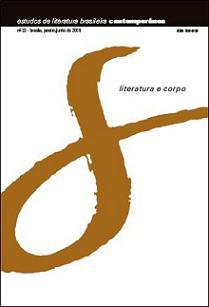A procura de si:
a representação do corpo gordo em Cíntia Moscovich
Abstract
Elemento privado, mas que incorpora e expressa diversas ideologias, o corpo é um lugar prático direto de controle social, segundo Susan R. Bordo. Se nas artes plásticas o corpo, muitas vezes, nos aborda diretamente por meio do olhar, quase nos desarmando; na literatura, ele costuma aparecer velado, sob uma cortina discursiva a ser desvendada pelo leitor mais atento. Este artigo traz algumas reflexões sobre a representação do corpo feminino, especialmente do corpo gordo, a partir do romance Por que sou gorda, mamãe?, de Cíntia Moscovich. Tema que aparece de modo periférico na literatura brasileira contemporânea, o corpo feminino fora do padrão é apresentado em primeira pessoa neste livro.
References
BORDO, Susan R. “O corpo e a reprodução da feminidade: uma apropriação feminista de Foucault”, em _______ e JAGGAR, Alison M. Gênero, corpo e conhecimento. Rio de Janeiro: Rosa dos Tempos, 1997.
BOURDIEU, Pierre. “A ilusão biográfica” em _______. Razões práticas: sobre a teoria da ação. Trad. de Mariza Corrêa. Campinas: Papirus, 1996.
FOUCAULT, Michel. Vigiar e punir. 32ª ed. Petrópolis: Vozes, 1987.
GOELLNER, Silvana Villodre. “A cultura fitness e a estética do comedimento: as mulheres, seus corpos e aparências”, em STEVENS, Cristina M. T. e SWAIN, Tania Navarro. A construção dos corpos: perspectivas feministas. Florianópolis: Editora Mulheres, 2008.
GOFFMAN, Erving. Estigma: notas sobre a manipulação da identidade deteriorada. Rio de Janeiro: Guanabara, 1988.
HALL, Stuart. A identidade cultural na pós-modernidade. Rio de Janeiro: DP&A, 2002.
MOSCOVICH, Cíntia. Por que sou gorda, mamãe?. Rio de Janeiro: Record, 2006.
Downloads
Published
Issue
Section
License
Authors who publish in this journal agree to the following terms:
a) The authors maintain the copyright and grant the journal the right of first publication, the work being simultaneously licensed under the Creative Commons Attribution License-Non Commercial 4.0 which allows the sharing of the work with acknowledgment of the authorship of the work and publication this journal.
b) Authors are authorized to enter into additional contracts separately, for non-exclusive distribution of the version of the work published in this journal (eg publish in institutional repository or as a book chapter), with authorship recognition and publication in this journal.
c) Authors are allowed and encouraged to publish and distribute their work online (eg in institutional repositories or on their personal page) after the editorial process, as this can generate productive changes, as well as increase the impact and citation of published work (See The Effect of Free Access).
d) The authors of the approved works authorize the magazine to, after publication, transfer its content for reproduction in content crawlers, virtual libraries and the like.
e) The authors assume that the texts submitted to the publication are of their original creation, being fully responsible for their content in the event of possible opposition by third parties.


